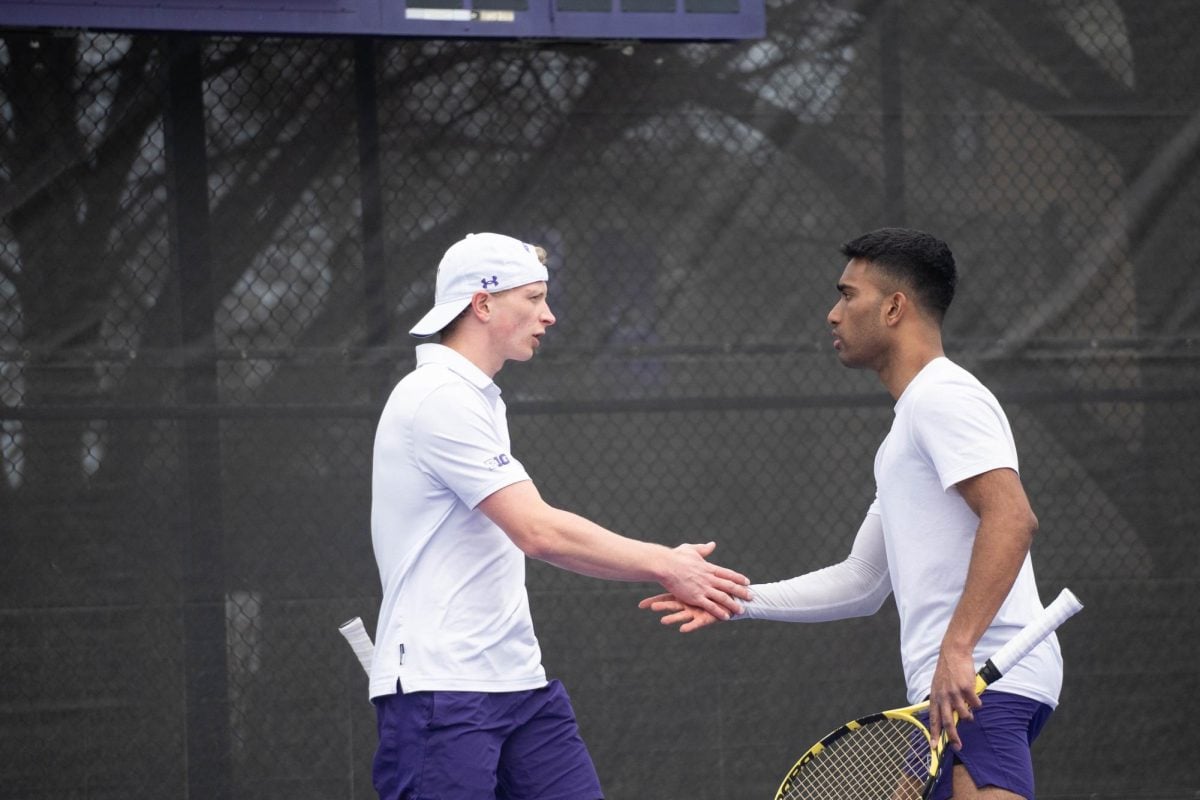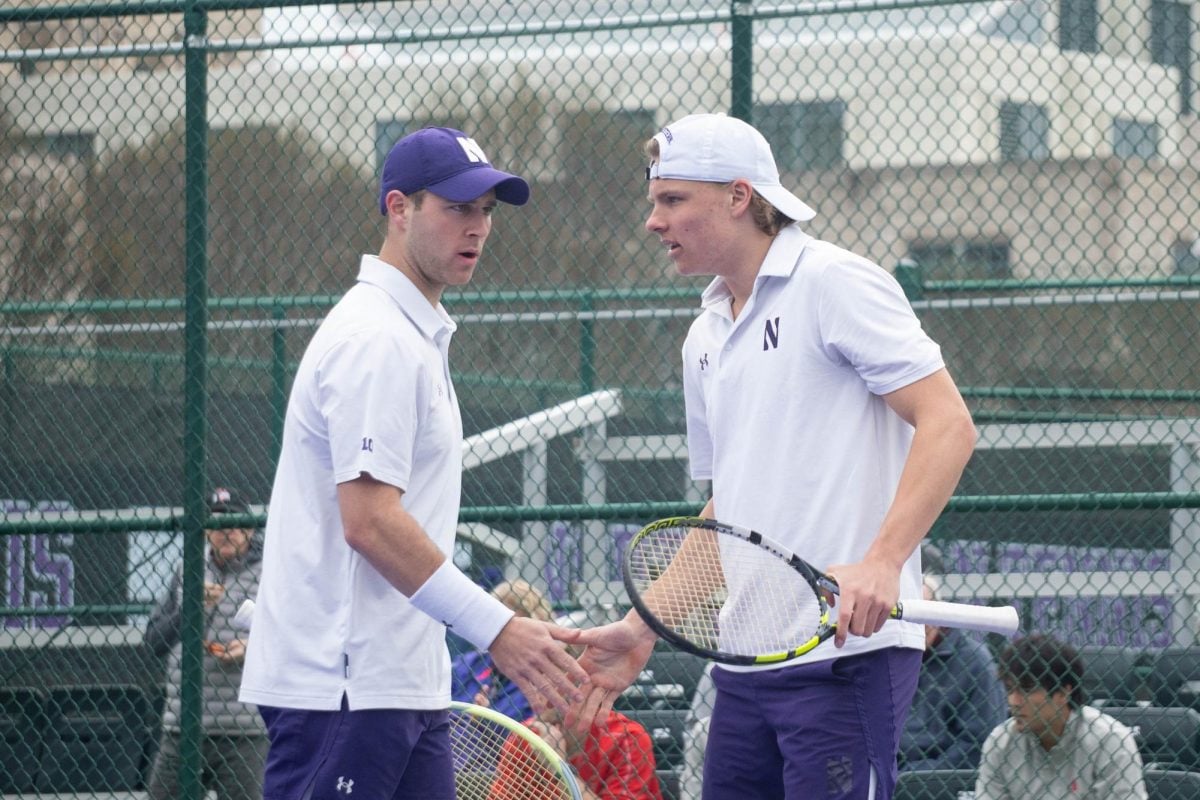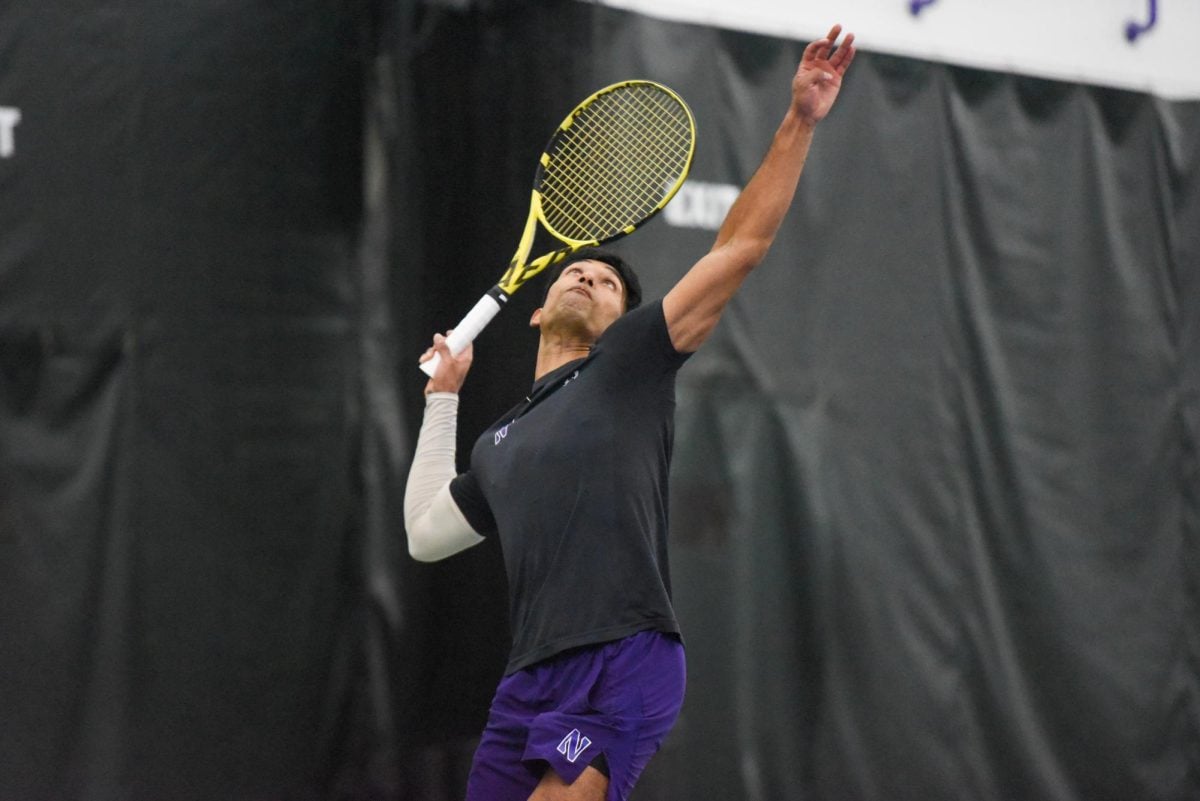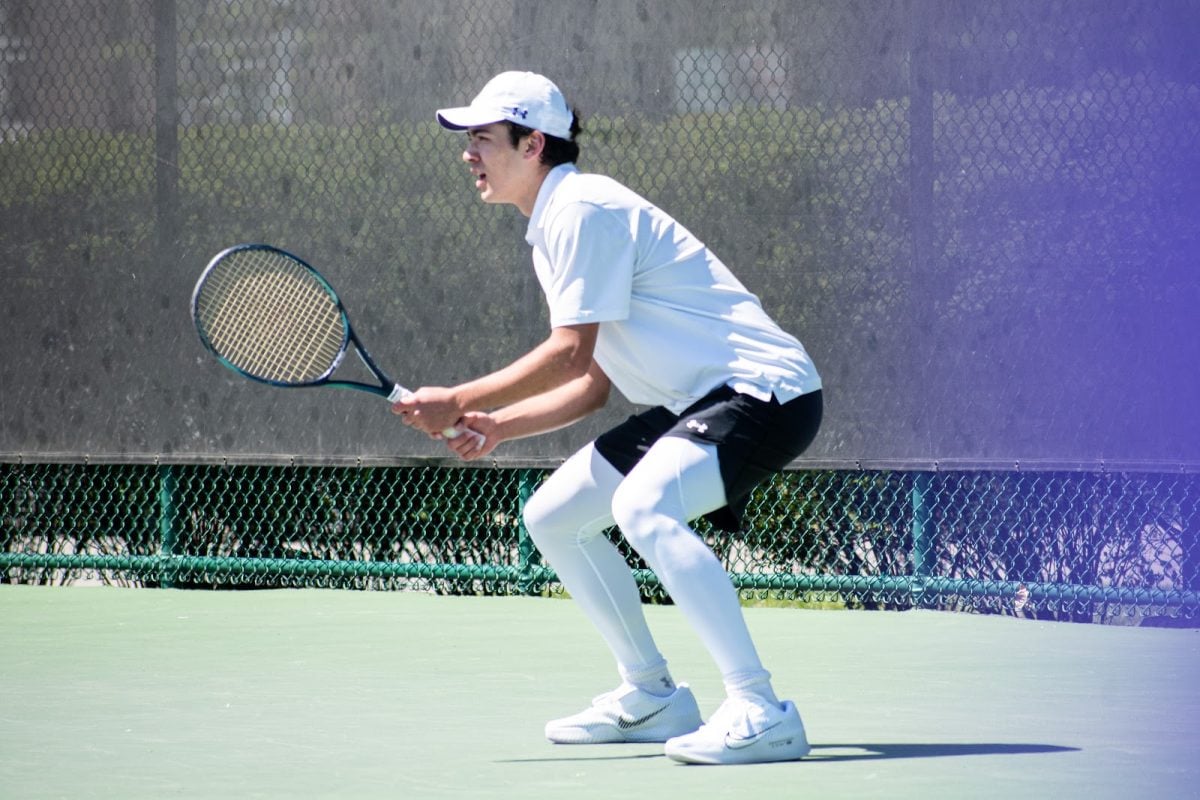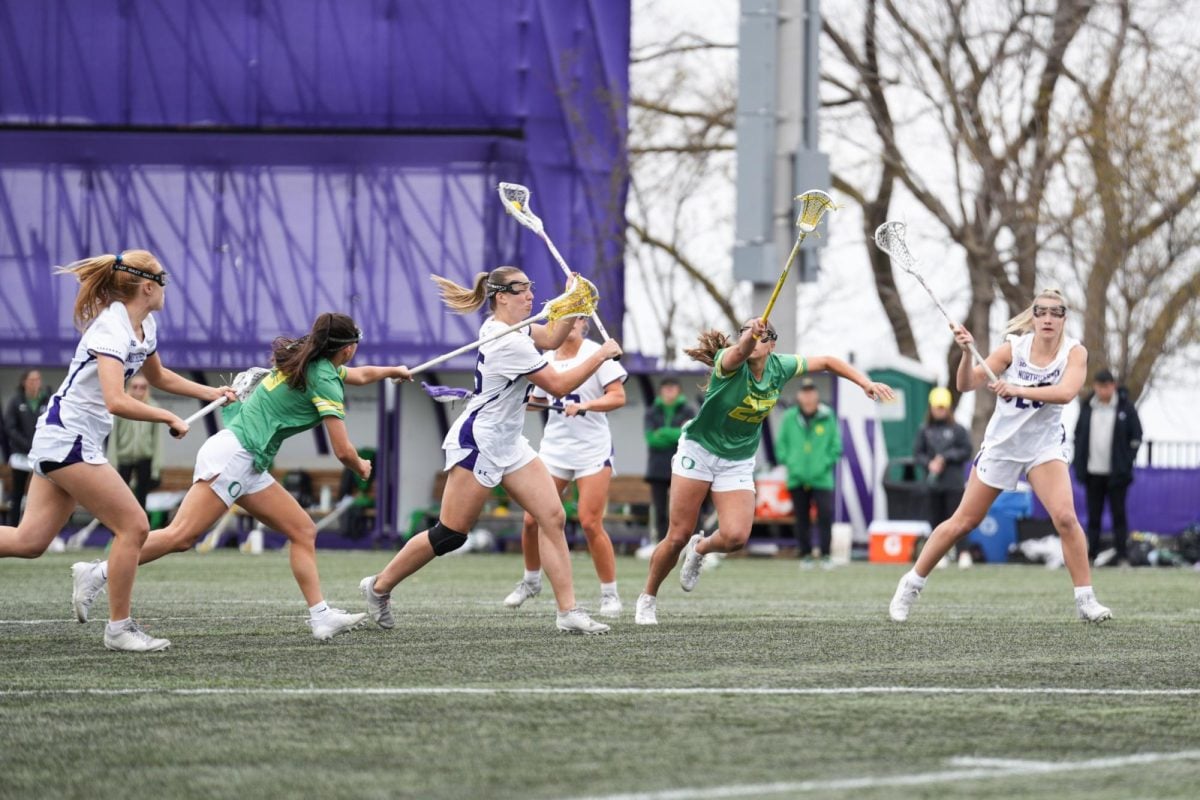In college, Northwestern men’s tennis assistant coach Chris Drake’s alter ego was San Antonio Spurs power forward Tim Duncan. For good reason.
As a captain at Brown during his junior season, Drake led his team to its first Ivy League championship in school history. Duncan joined the Spurs in 1997, and two years later San Antonio won its first NBA title.
Now in his second year at NU, Drake is hoping to make the Wildcats a consistent competition in the Big Ten and the nation. Since Duncan’s debut, the Spurs have won at least 50 games in all but one season, making San Antonio one of the NBA’s most enduring franchises.
But the similarities don’t stop there. While Duncan and Drake play two different sports, they share an affection for the fundamentals and a steady, unwavering style of play.
Teammate and occasional doubles partner at Brown Kris Goddard complained watching Duncan is boring-he takes bank shots, which aren’t necessarily a thing of beauty but get the job done. If boring wins games, Drake has no problems with the comparison.
“Chris is the same way,” Goddard said. “He does what it takes no matter how it looks. If he has to play a whole match hitting slice forehands at the back of the court with his *ss rubbing against the fence, he will-and he’ll win.”
As a player, Drake spent three years playing professionally and ranked as high as No. 92 in the world in doubles.
But Drake decided to trade his playing shoes for a whistle. Just one month after NU hired coach Arvid Swan for the top spot, Swan asked Drake to join his staff.
The duo has set out to change the balance of power in one of the toughest men’s tennis conferences in the country.
In just their second year in Evanston, Drake and Swan helped the Cats finish the 2009 season 18-9, tied for fourth in the Big Ten and ranked as high as No. 48, a stark contrast from a last-place finish and a 7-17 record in the previous campaign.
But this year’s 10-15 overall record, which included just one regular season conference win, was a step back. For the assistant coach, the Cats’ effort was not a flop.
“Where things broke for us last year, they (didn’t) this year,” Drake said. “You can do everything right and still lose a match. Either way, we still have had some success this season and some things we can build on.”
Looking for a place to start? Since Drake’s time at NU, the Cats have had two of the nation’s highest-ranked recruiting classes, ranked 8th and 12th by tennisrecruiting.net. This year, freshmen Sidarth Balaji and Spencer Wolf consistently played at the top of the Cats’ lineup, and sophomore Josh Graves took over at No. 1. And though Drake and Swan share recruiting responsibilities, once the rookie players arrive, Drake is their on-court coach and individual teacher. For NU’s drastic improvement in 2009, Drake was awarded the ITA Regional Assistant Coach of the Year Award.
Ever modest, Drake immediately gave credit to the team. In his mind, the award recognized the player’s hard work-it just happened to have his name on it.In his short time at NU, Drake’s presence has already been felt. Just like Duncan transformed the Spurs into a yearly title contender, Drake has big plans for the Cats.
BOSTON BEGINNINGS
Like many professional tennis players, Drake grew up surrounded by the sport. His father, William, played for Minnesota during the 1970s and coached at Wimbledon for 14 years. William now works as a tennis professional at a golf and tennis club outside Boston.
Though tennis seemed like an obvious choice for Drake, he dabbled in both little league baseball and soccer before shifting his focus to tennis at age 13. William recalled Chris was always his team’s “go-to” guy for a last-minute goal in soccer or a ninth-inning run in baseball.
By age 5, Chris was already hitting a ball against the garage door most afternoons-his early attraction to tennis was hard to ignore. As his coach, William was impressed by his son’s commitment to the game.
“He was always distinguishing himself by his focus and his drive to excel,” William said. “A lot of the kids his age weren’t as invested and it was always a contrast that I noticed.”
William and his wife Pat stressed the importance of balance to their son. Tennis was an option and never an obligation. William’s parenting philosophy was that his kids should be able to determine their own destinations academically, socially and athletically.
“My dad’s input was that if I wanted to do it, he would support and coach me,” Drake said.
“But it was my decision. That was always very clear. If he had really tried to push me, maybe I wouldn’t have played.”
CAPTAIN CHRIS
Drake carried that balance into his collegiate career at Brown.
As team captain in 2002, Drake helped lead the Bears to the first Ivy League championship in school history. In 2003, the senior captain was awarded the ITA Rafael Osuna Sportsmanship Award, the longest-standing collegiate tennis award.
College was also a chance for Drake to break away from his old coach-his dad. Drake even put some restrictions on how many of his matches his parents were allowed to watch.
“He wanted it to be his own thing, he was ready to listen to another coach,” William said. “That was the first time he was able to make his break.”
When coach Jon Choboy left Brown for a head coaching position at North Carolina State, former Miami (OH) women’s tennis coach Jay Harris took over for the Bears before Drake’s senior season.
With both a new assistant coach and head coach, Drake was the team’s only constant in terms of leadership. For Harris, Drake made the transition seamless.
“I had a captain that knew how to push the team aspects of the group,” Harris said. “I didn’t have to come in and be the disciplinarian because Chris was there. He not only taught some of the guys the expectations of the program, but he taught us the expectations as well.”
Drake’s childhood experiences as a team player paid off. Most of his success in college came as a doubles player and from supporting his team at the bottom of the singles lineup. Harris explained that when the team would play basketball or soccer for conditioning, Drake filled whatever role helped his team most. The same was true on the tennis court.
“He was a beast in all of those (team sports),” Harris said. “He always wanted to be in the fight, whether that was playing tennis or playing soccer-he would take on a guy three times his size. He was the guy who didn’t care what number he played, as long as he was helping the team win.
TIME ON THE TOUR
With a successful collegiate career behind him, Drake decided to put down his racket to coach juniors at a tennis club in Boston. After taking a year off, he decided he still wanted to perfect his own game, and he began playing professionally. Outside of his accomplishments on the court, Drake met his wife Eliza while staying at a friend’s apartment during a tournament in New York City. The two kept in touch while Drake traveled around the world, and eventually he started making frequent stops in New York City.
In the summer of 2007, Drake decided he had gotten the most out of his professional career. In the eyes of his father, the “cutthroat nature” of doubles play didn’t line up with Drake’s affinity for the team dynamic of tennis.
“He had several partners that he teamed up with and sustained for some time,” Willaim said. “But the permanence just wasn’t there in the pros.”
After a brief period of indecision about the next step in his life, Drake completed a summer business program at the University of Chicago. For a while, it seemed Drake would leave the tennis world for good. Then he got a phone call from Swan.
In August, Swan was hired as the head coach for NU, and Drake joined as assistant coach in September.
FROM CAPTAIN TO COACH
Swan and Drake had an immediate impact on NU. In 2009, the pair led the Cats to their first NCAA tournament since 2005.
Drake was recognized for his contribution to the comeback with the regional assistant coaching award.
“Chris was integral to our turnaround last year,” Swan said. “He’s the best assistant coach in D-1 tennis. He’s done everything that our guys aspire to daily. He played at a good school, he did well academically, had a very good pro career.”
Swan said he relies on Drake for many aspects of NU’s tennis program, including player development and recruiting. But more important than his contribution to the team’s success, Swan described Drake as a “good friend and a great human being.”
In terms of the day-to-day duties of coaching, Drake spends most of his time with the players. Drake also helps Swan administratively, contacting alumni and recruits and helping plan practices and scouting reports.
Drake often acts as a sparring partner when the players are up for a challenging match. During an average day, Drake will spend from six to 10 hours on the court.
“It’s a physically taxing job, to say the least,” Drake said. “It keeps me in pretty good shape, but it wears you down at times.”
Though the majority of Drake’s day is consumed with tennis, he explained a sizable chunk of his coaching duties include helping his players with any issues they may have off the court. If a player loses confidence or becomes overwhelmed academically, Drake said the player’s performance will reflect those difficulties.
“It’s a lot of personal connection as well,” Drake said. “If the kids don’t think they can talk to you or trust you, the things you’re trying to get out of them on the tennis court may not come through. All the time you’re spending on tennis may not pay off if you’re not there for the kids.”
Because of his time at an academically demanding school like Brown, Drake said he can relate to the difficulties of balancing NU’s workload with the challenges of playing a Division-I sport. The same “team-first” mentality that Drake has carried with him throughout his life is one of the main values he tries to instill in players at NU.
“Through experience, as the team does well they realize the payoff for all the work and sacrifices they’ve made in the best interest of the team,” Drake said. “Everyone enjoys it once they start to bond with their teammates and get that team experience.”
Sophomore Josh Graves said Drake has been a mentor and helped him make visible improvements in his game. Playing with Drake served as good practice for some of the top-ranked singles players Graves faced this year.
“The level is really high,” Graves said. “When we compete against each other, I feel like I’m playing against another good player, not my coach. He’s unbelievable.”
William said players not only heed Drake’s advice because of his expertise, but they follow him unquestioningly because of his character and good intentions.
“He walks the walk that he talks,” William said. “He has that high standard of ethics and morality with athletic achievement. Young people can see it and that’s what allows him to be a mentor. He does it naturally.”
Graves also pointed out that it has been helpful to have two coaches who differ in coaching style, but still find a way to balance each other out. The two can get the same message through to the players in different ways while still achieving a common outcome-competitiveness and hard work.
“In the end, we both have the same goals and the same greater picture in mind,” Drake said. “Always with a head coach and an assistant, it’s important that they have the same core values. How you go about it is less important-it’s helpful if you have differences.” Baby on the way
This summer, Drake will transition into yet another new team role. Only this time, his team is his family. Drake said he is both excited and nervous to become a father. With a new baby comes new responsibilities, but as always, Drake said it will help him maintain the balance in his life.
“Maybe some of the guys will beat me now,” Drake said with a laugh. “I won’t be getting enough sleep.”
Even with the stresses of a new baby on the way and a full day on the court, Drake still finds time to hit a few balls with his old coach.
“The last time I was out there (Evanston), I was preparing for a senior tournament,” William said. “After eight hours on the court, he still came out and hit with me to get ready for the event.”
For now, Drake and his growing family are settled in Evanston and don’t plan on leaving anytime soon. For the Cats, that’s a good thing.
“He’s connected to every single one of us as a friend,” sophomore Tobias Reitz said. “Everyone knows that he really knows something about tennis and believes what he says. We really follow his advice.”sarahkuta2012@u.northwestern.edu
